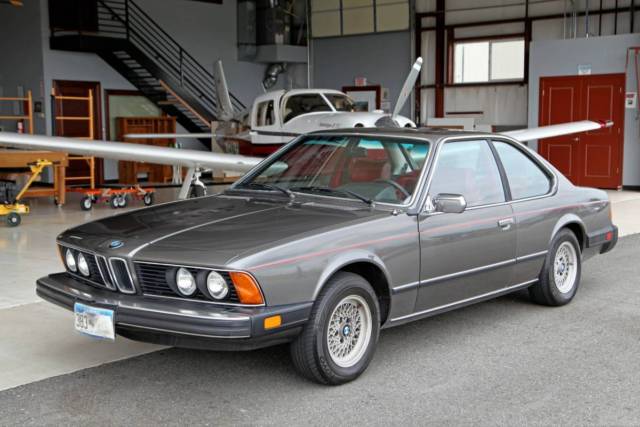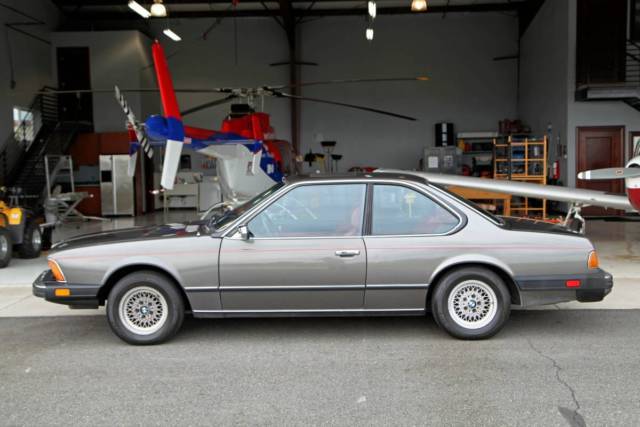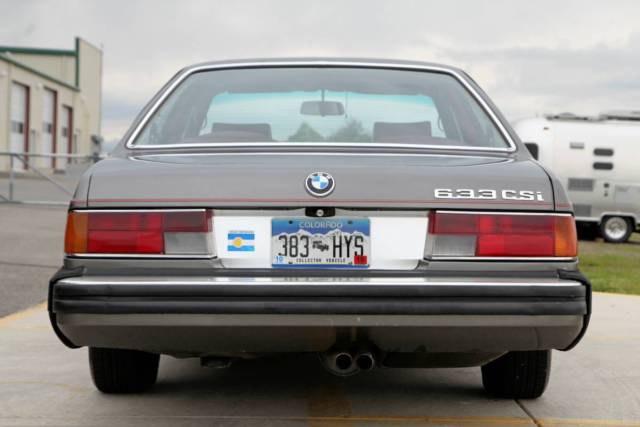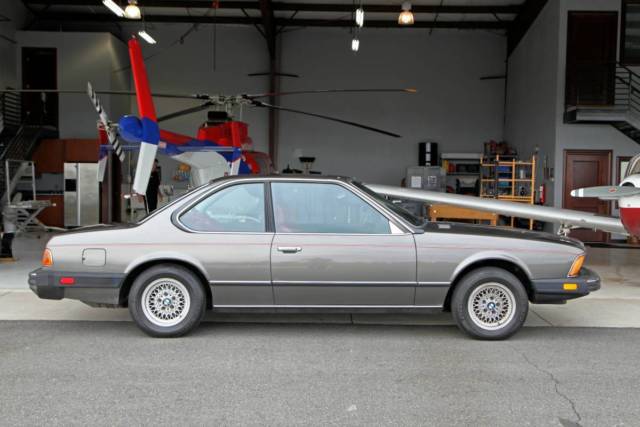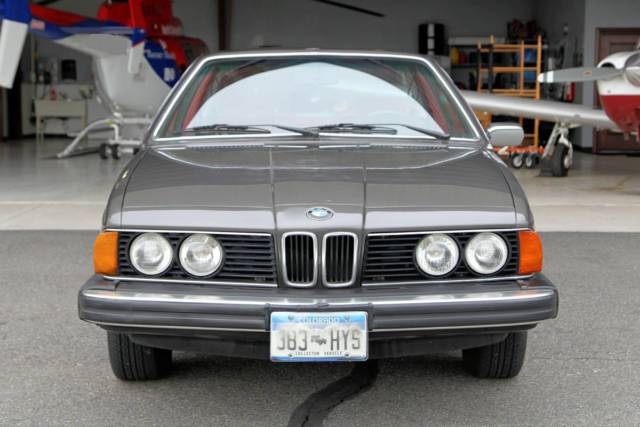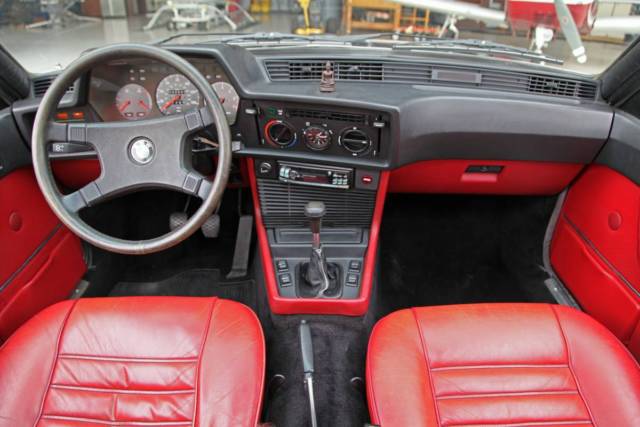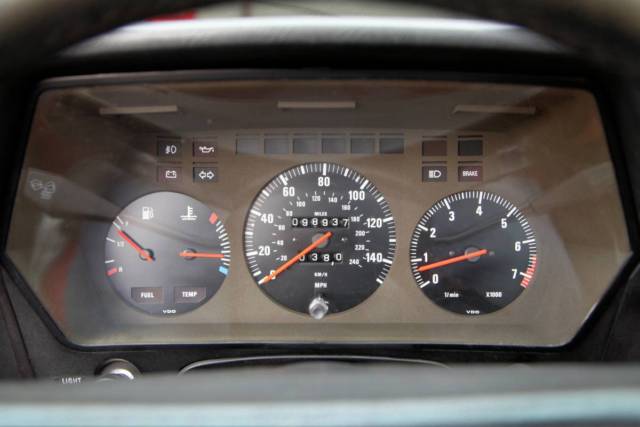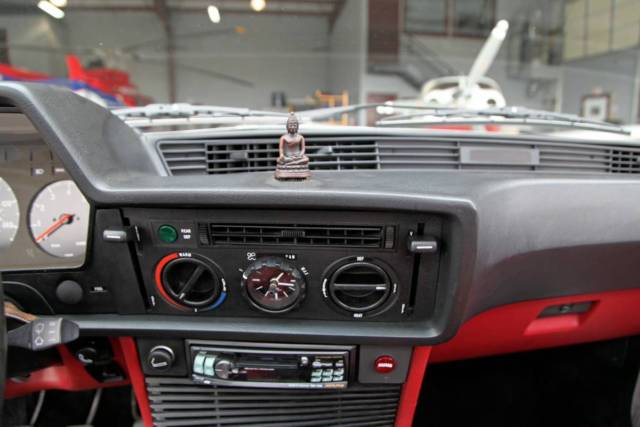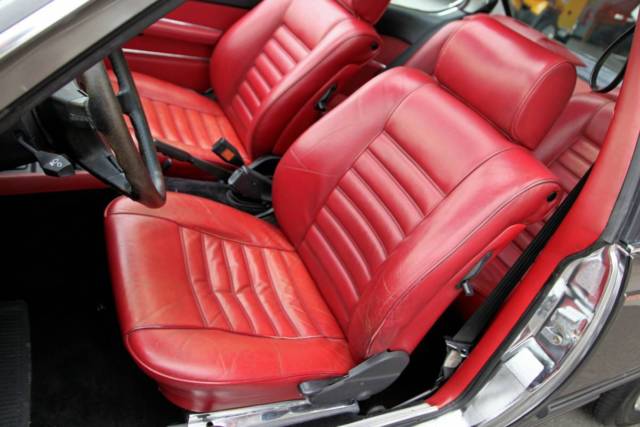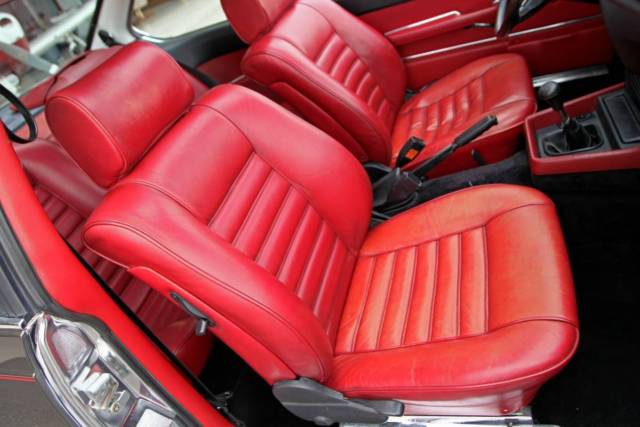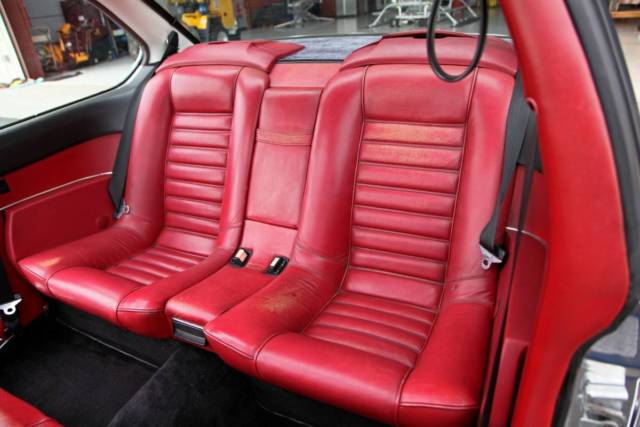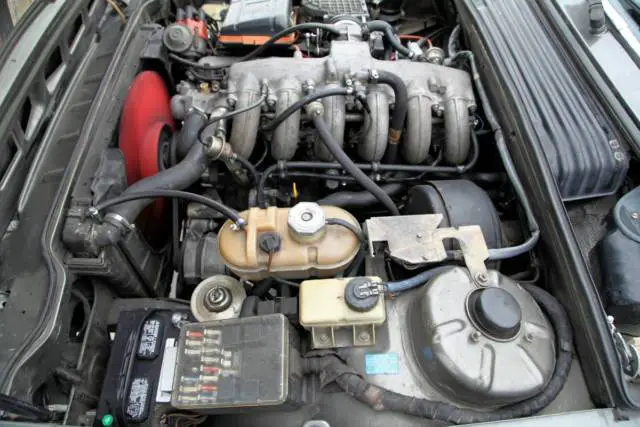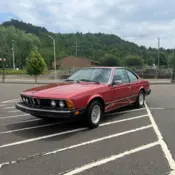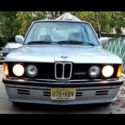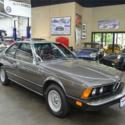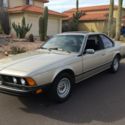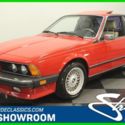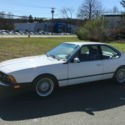1979 BMW 633CSi Coupe (E24), 1-Owner, 99K Miles, Manual, Anthracite Grey / Red
| Make: | BMW |
| Model: | 6-Series |
| SubModel: | 633CSi |
| Type: | Coupe |
| Trim: | Base Coupe 2-Door |
| Year: | 1979 |
| Mileage: | 99,100 |
| VIN: | 5525367 |
| Color: | Antracite Grey Metallic (055) |
| Engine: | 3.2L 3210CC l6 GAS SOHC Naturally Aspirated |
| Cylinders: | 6 |
| Fuel: | Gasoline |
| Transmission: | 4-Speed Manual |
| Drive type: | RWD |
| Interior color: | Antique Red Leather (Antikrot) |
| Vehicle Title: | Clear |
| Item location: | Denver, Colorado, United States |
1979 BMW 6-Series 633CSi Additional Info:
1979 BMW 633CSI
Anthracite Grey Metallic Exterior (055)
Antique Red Leather (Antikrot) Interior
99,000 Miles
M30B32 Inline 6-Cylinder Engine
4-Speed Manual Transmission
Original Owner Car
Colorado Car
Factory Floor Mats
Fitted Sheepskin Front Seat Covers
Car Cover
Background
The first generation BMW 6 Series was codenamed the E24 internally, but the rest of the world knew it by a more formidable name: The Shark. The name fit not only the 6er’s form, but also its function. Unleashed on the autobahn, the Shark was an exceptional grand tourer that would devour miles at terrific speed while treating its occupants to fine sporting luxury. Its sleek and graceful lines were the product of BMW Director of Design Paul Bracq, who ensured that it was a classic in the making. The two-door 633CSi coupe (CS stands for Coupe Sport) was the sporting driver’s alternative to the big four-door German sedans and cheap American luxo-barges—and unlike the latter, the shark could go around corners. It was powered by a fuel injected 3.2-liter version of the venerable M30 inline six-cylinder engine producing 181 horsepower. The 633CSi featured revolutionary technology, like Bosh L-jetronic engine management and was one of the first BMWs with a check control panel. Time has been kind to the E24, earning it the status of a classic and as one of BMW’s most elegant designs.
Summary
The 633CSi I am selling is a very special example. I am selling it on consignment for the original owner who ordered it from Boulder European Autos, now Gebhart BMW of Boulder, Colorado. It was purchased on May 25th, 1979 for $25,070—that's $83,000 in 2016 money! Since then, he has lovingly enjoyed and maintained it with impeccable stewardship, the only reason he is selling it is to fund travel in his post-retirement. It has always lived in Colorado and is virtually rust-free. It as always been his second car, living indoors and being spared exposure to Colorado winters. I have extensive maintenance records dating back to 1987 when it had only 30,000 miles on the odometer (the previous records were lost in a move). The owner has always done annual oil changes (sometimes only a few hundred miles apart) and had a spare-no-expense attitude when maintaining his baby. The troublesome thermo reactor emissions system was replaced with E12 528i components by a local old school BMW specialist. A new cylinder head was done too, as those often failed as a result of the thermo reactors. See the mechanical section below for a complete description. It comes with the original floor mats, fitted sheepskin front seat covers, and an indoor car cover. When I asked the owner what his favorite thing about the 633CSi is, without missing a beat he said; “It’s a BMW that drives like a expletive expletive car should!” I couldn't agree more!
Exterior
Admire the 633CSi at rest and it is clearly The Shark—a grand touring sport coupe. Legendary automotive executive Bob Lutz influenced BMW’s decision to start with a fresh canvas for the E24, rather than a face-lifted version of the E9 3.0 coupe. Still, the E24’s design language is classic BMW. A long hood protrudes over double headlights framing square kidney grills. The roof slopes above a larger than normal Hofmeister Kink into a comparatively short trunk lid; the shallow raked rear window glass is nearly the same size as the front. Fourteen-inch standard (not metric TRX) “basketweave” wheels are original and correct, but I can't help but wonder how good slightly larger weaves or even BBS LM’s would look. The rear shocks are pre-self leveling era, but they are original, leading to a slightly saggy bottom—slightly. That is easily forgiven, though, as most things born in the 1970s have slightly saggy bottoms these days—slightly! The Anthracite Metallic Grey paint is accented by a white and red pin stripe that matches the red interior. The condition of the paint is good, although there are small areas of opaque clear coat on the hood and sunroof panel. A day with a polisher would do wonders to improve the finish, but the clear coat will not be fully corrected without paintwork. There are also a few small areas of peeling clear coat next to the windshield wipers. There is one very small rust spot (smaller than a chapstick container) on the lower right fender behind the trim strip (pictures are on our website if you are reading this elsewhere). There are a few other superficial rust spots under the carpet in the trunk floor, likely due to a seeping trunk seal (pics are also on our website). In June of 1999 the left front fender was repainted due to a brush with another car in a tight alley. Then the same fender was replaced in January of 2003 for another incident in the same alley! The damage was minor and the repair was a high quality job that has withstood the test of time. There is no visible evidence of either repair and both incidents are fully documented in the maintenance records. The window glass is in good shape without major pitting. The wheels are straight and true, and the Toyo Proxy TPT tires have 60% tread remaining.
Interior
Open the door and you are greeted by bright red Antique Red (Antikrot) red leather. In a word it is striking. Sit down in the bright red seat and you take a step back in time. Aluminum inner doorsills are a subtle detail that this is a luxury grand tourer. The tiered dashboard has recessed vents and a large Fasten Seatbelt sign to remind to your passenger this is sport coupe, and you better strap in! A small Buda statue, acquired from the owner’s world travels, sits prominently front and center. It will be sold with the car, and I insist that it stay put—its Karma! The instrument cluster has red gauge needles, a clue to those in the know of the 633CSi’s halo model status. The center cluster is a work of functional art. The clock is integrated into the fan dial, above a center auxiliary vent that angles toward the driver. The interior is intact and in very good shape considering its age. The steering wheel and shifter have slight wear, consistent with age, but are very presentable. Sheepskin covers have protected the front seats; I only removed them to photograph the seats for the ad. The leather is soft to the touch and all seams are intact. The front seat bottoms have slight color fading, but are very presentable. All seat adjustments work; they are manual too—which is a good thing. The rear seats are as plush as the fronts with a few small discolored areas. The plastic headrest backs on the rear shelf do have some deformation and small cracks. The dashboard also has a few small cracks, typical for all BMW’s of this vintage (detailed in the pictures). The door cards are in great shape, although the small chrome trim strips covering at the top of each door handle are both peeling. The passenger side door card has a small tear at the lower rear edge, likely from a seatbelt being shut in it. The sunroof headliner has some discoloration above the driver’s seat (a common E24 issue). The large trunk tool kit is complete, down to the blue BMW rag. All power functions work. The heat blows warm, the air conditioning blows cold. The left rear window switch can be a little finicky when rolling the window up, but with finesse it works every time.
Mechanical
This 633CSi is in exceptional mechanical condition. The owner spared no expense in his maintenance and care of it over the years. The result is a 37-year old car that runs and drives almost like it did when it was originally delivered. It starts without hesitation, idles smoothly, pulls hard under acceleration, and brakes just as strong. The steering is tight, the shifter is crisp, and the suspension is compliant—even with a slightly saggy bottom. I have extensive documentation of annual oil changes, which are sometimes only a few hundred miles apart. A spreadsheet summary of all maintenance records is available upon request. In 2015, the thermo-reactor portion of the engine management system was converted to 1979 528i components, including the intake manifold, harness, DME, down pipes and the addition of a catalytic convertor. The ECU, distributor cap, rotor, air valve, were also converted. Other major components that have been done over the years are the cylinder head, cooling system (multiple times), air condition system (converted to R134), brakes, transmission seals, flex disc, clutch, clutch slave and master cylinders. The history also shows regular service and replacement of small components that all BMW’s eventually need like door locks, window switches, dashboard switches, lights, seats, and door seals. The suspension could use a refresh (saggy bottom), but it could also be lived with comfortably for quite a few more years. This is a mechanically sound 633CSi. It deserves an owner willing to continue the maintenance pedigree it has received. Make no mistake, it will inevitably need continued care and maintenance like all classic BMWs do, but it is a well cared for and documented example.
*California buyers. The Vehicle Emission Control Information sticker shows this 633CSi as a 49 state model, and it does not have the original emissions control equipment (removed thermo reactors). It is also has a Non-Catalyst sticker, even though it has a catalytic converter retrofitted. This certainly makes it non-CARB legal.
Glen Shelly is a low-volume auto brokerage focused only on the highest quality vehicles. We are two airline pilots, mechanics, and auto enthusiasts who bring a high level of professionalism and attention to detail to the automobile business. Our philosophy is to keep our inventory small so that we can focus on thorough mechanical and cosmetic preparation of the vehicles we select. We have more than 20 years of experience restoring and repairing automobiles and are intimately familiar with our cars. We do the inspections, service, detailing, and corrective maintenance using only OEM parts and service manuals. We offer an informed and low-pressure sales environment, resulting in a premium buying experience. Find out more about us at www.Glenshelly.com.
On Jul-07-16 at 00:20:34 PDT, seller added the following information:
Quick Update:
I took 633CSi for a drive over the holiday weekend and there is something truly special about this car. I grin ear to ear every time I drive it. Inside you are bathed in red leather, itcompletely makes the car. Other people give itthumbs up on every drive. It really is stepping back in time, but it was so good back inthe '70s that it is completelylivable in the modern world. The M30B32 has that classic BMW linear torque delivery and pulls wonderfully strong. I noticed a slight hesitation at 5K RPM and bounce inthetachometer. I took it to the old school BMW specialist who did the E12 component swap and he quickly diagnosed it as the Halls Unit in thedistributor. He recalled that the original distributor was left in the car, but he still had the E12 distributor, so we swapped the E12 distributor in. I took it on a long test drive afterward and it ran flawlessly. I've posted a video of a 2nd gear pull to redline below. I should note that it was over 90 degrees and I was at 6000 feet. The temperature never gets above 1/3 and the air conditioning blows ice cold.
On the drive, I did notice two other items that I should be mentioned. First, the parking brake light switch needs adjustment. If you don't jiggle the parking brake handle correctly, the light will stay on or come on at random. Once you get the handle in the right spot, it will go out and stay out. That should be an easy fix. The second item is a bad air condition switch on the center vent, also known as theauxiliary vent. The effect is the center vent will always blow cold, even with the heat on and the rest of the vents are blowing warm. This vent has its own open and close lever, so you can stop this by simply closing the vent. It can be fixed relatively easily.
The mechanic remembered a lot about this car and was verycomplimentary of it. He pointed out that it does not have acatalytic convertor, I was mistaking the center resonator for that. And that the resonator had a small leak on the aft side that he had fixed with exhaust putty. He recommend removing it completely, which would make the exhaustsoundbetter too. This is nothing that would need immediate attention, just a recommendation. The important thing to note is that I was incorrect in saying that a catalytic convertor was includedwith the emission component swap, it does not have acatalytic convertor. The "Non-Catalyist" sticker is still in place, so this shouldn't be aproblem with emissions.
We also talked aboutthesuspension. I don't have a receipt of it being replaced in the records, but it does have adjustable height Bilstien shocks in the rear, which are not factory. So at some point those have been replaced. The car feels tight on the road and the suspension is firm, but compliant.
You can see a video of a 2nd gear acceleration to red line here (eBaywon't let me post it):https://youtu.be/YZgSRe8FyT0
